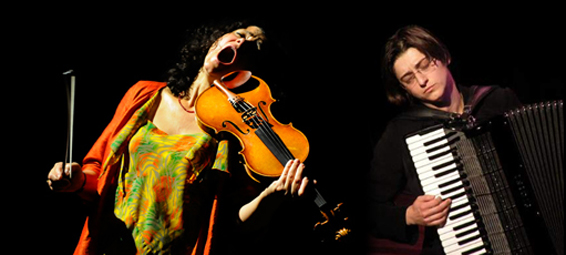This past weekend, the Soundings new music series, now in its second year at the Nasher Sculpture Center, once again delivered a flawlessly paced program in which the classical tradition intertwined convincingly with frontline musical innovation. And, as usual, musicians from the Yellow Barn Chamber Music Festival inVermontprovided the core of the material.
For this concert, traditionally trained musicians from Yellow Barn (violinist Anna Elashvili, violinist Keats Dieffenbach, violist Margaret Dyer, and cellist Hamilton Berrywere joined by members of Checkpoint KBK, an ensemble that almost defies description. Clarinetist David Krakauer and accordionist Merima Kijuco were both remarkable in their own right, while Moravian-born Iva Bittova, who plays the violin and sings (and makes bird noises, and dances, and composes, all at pretty much the same time) must surely be one of the most remarkable performers in the world today.
Titled “Cultural Heritage, Creative Voices,” the program brought together several distinctive strands, and wove them together seamlessly. Relatively recent music by Gyorgy Krutag, Sofia Gubaidulina, and Osvaldo Golijov represented the cutting edge of contemporary “serious” composition, while mainstream twentieth-century works by Bartok, Martinu, and Janacek were presented in transcriptions—and with performance styles—that emphasized their inspiration in folk music. Moravian composer Gideon Klein’s String Trio, completed in a Nazi concentration camp shortly before Klein’s death in 1945, while totally unfamiliar, was the one entirely traditional work presented in an entirely traditional manner; improvisations and works based on improvisations by members of Checkpoint KBK were strategically interspersed.
Obvious themes of longing and tragedy predominated, often obvious (as in, for instance, vocalist Bittova’s arrangements of Martinu and Janacek, or in accordianist Krakauer’s “Synagogue Wail”); at other moments, the mood would turn suddenly esoteric, as in the spare post-modernism of Gubaidulina’s Silenzio for Strings, or Kurtag’s Signs, Games, and Messages.
But the trajectory of the concert was clearly toward an increasingly passionate experience, landing, with vocalist Bittova clearly in the spotlight, in the overwhelming emotionalism of Kijuco’s hair-raising arrangment of the Bosnian folksong “I Am My Mother’s Only Daughter”—the title of which doesn’t begin to describe the scorching passions contained therein.
The classical music establishment is searching—sometimes desperately, it seems—for new ways to engage an increasingly fragmented audience. In their highly intelligent, unfailingly dramatic approach, both the Soundings series as a whole and the musicians of Checkpoint KBK have discovered a promising direction.






